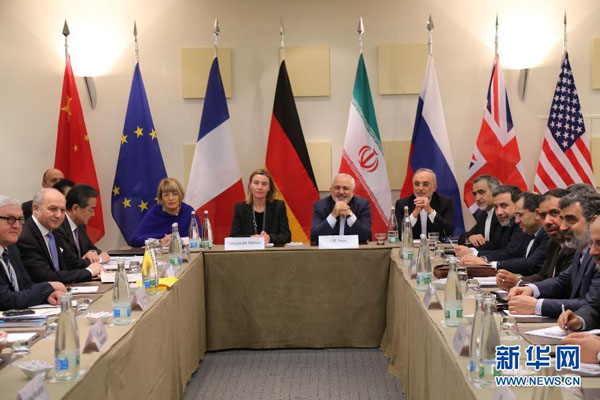Iran nuclear talks to yield positive consensus
 0 Comment(s)
0 Comment(s) Print
Print E-mail Xinhua, March 31, 2015
E-mail Xinhua, March 31, 2015
The ongoing round of talks on Iran's nuclear program in the Swiss town of Lausanne will most likely end with positive broad consensus, though a concrete formal deal remains hard to reach, analysts have said.
|
 |
|
The ongoing round of talks on Iran's nuclear program in the Swiss town of Lausanne will most likely end with positive broad consensus, though a concrete formal deal remains hard to reach, analysts have said. [Photo/Xinhua] |
"I'm pretty certain tomorrow or Wednesday, the two sides would shake hands and say they have agreed on a broad agreement, while some outstanding issues are left for future talks," Sadeq Zibakalam, professor of political science of Tehran University, told Xinhua in an interview on Monday.
Unprecedented frequency, seriousness and intensity of talks rekindled Iranians' hope for success in the nuclear negotiations.
High-profile negotiators, such as Iranian Foreign Minister Mohammad-Javad Zarif and U.S. Secretary of State John Kerry, have been meeting frequently in the past weeks and announced important progress had been achieved.
The talks have raised so much hope in Iran and the international community that it would be embarrassing for Iran and the West to leave the negotiation table empty-handed, Zibakalam said.
In addition, Iranians are eagerly waiting for the talks to end sanctions and bring relief to the crippled economy. Failure of talks would be a fatal blow to people's confidence in the economy.
"Everyone is hoping for something good to happen. If you ask them, he or she will not be able to tell you specifically what will happen. But it is the general mood that things will get better," he said.
"The worst is over for nuclear talks, no matter what the result," Zibakalam said, as neither side wants to return to those half-hearted futile talks hosted by previous administrations.
REALISTIC EXPECTATION
However, it would be less likely for both sides to sign a framework deal, as Iran had openly rejected the idea of two-stage agreement.
"Objection to the two-stage agreement is a consensus of the whole Iranian political establishment," Mohammad Marandi, dean of Tehran University's faculty of international studies, told Xinhua on Sunday.
It is possible for the ongoing talks to yield certain agreement on the framework of a final deal, but it is not likely to be a formal one, he added.
After an incomplete agreement is signed, there will be no mechanism to make sure that the United States and its allies will continue talks with Iran to actually solve the nuclear issue, Marandi said, adding that Iran has learned the lesson from negotiations between Palestine and Israel where half-finished deals failed to bring peace and solution.
The United States has been urging Iran to ink a political framework agreement by the end of March before a final comprehensive deal can be clinched by June 30.
If Iran signs a framework agreement, the United States and its allies will use it as a bargaining chip against the Islamic Republic in the future, Iran's Supreme Leader Ali Khamenei warned earlier this month.
Iran rejected the two-stage arrangement because Iranians do not want the negotiations to drag on for months. "They want tangible results now," Zibakalam said.
However, not signing a framework deal does not mean the talks will fail. Although he's not sure what result the negotiations can achieve, Zibakalam believes at least they will not break apart.
"(Because of the hopes and efforts put into the talks,) they cannot turn back and say we can't reach an agreement, and we are back on square one. This is exactly what will not happen."
REGIONAL ISSUES A NEW FACTOR
Marandi rejected speculations that tradeoffs on regional issues are being made in the nuclear talks as Iran's influence in crisis-ridden countries such as Yemen, Iraq and Syria grows stronger.
Iran does not want to bring regional issues into the talks as it will only further complicate things and benefit the Western powers, he said.
Earlier this month, Khamenei also urged talks to focus solely on the nuclear issue, saying Iran does not want to discuss regional issues with the United States whose goals are opposite to Iran's.
Even though negotiators officially are not talking about regional issues, it has become obvious that the United States and Iran have common enemies in the region, such as the Islamic State and Al-Qaida, Zibakalam said.
The United States has realized that without support from Iran, it would be difficult to combat extremism in the region. The situation in Yemen, Iraq, Syria and Afghanistan all demands new understanding between Washington and Tehran, he added.
The notion of common enemy is a new development that can boost the chance of solving the nuclear issue, Zibakalam said.






Go to Forum >>0 Comment(s)